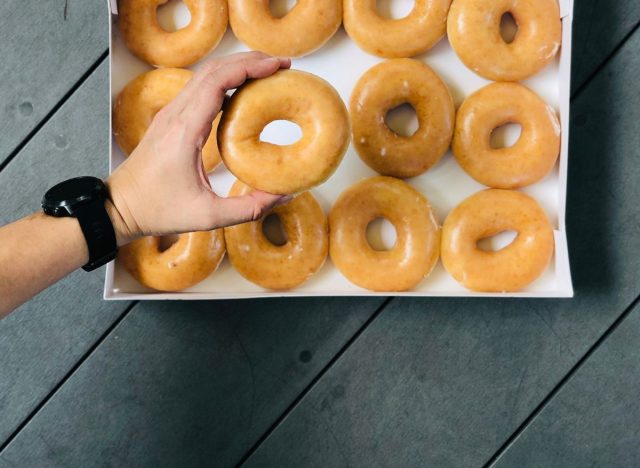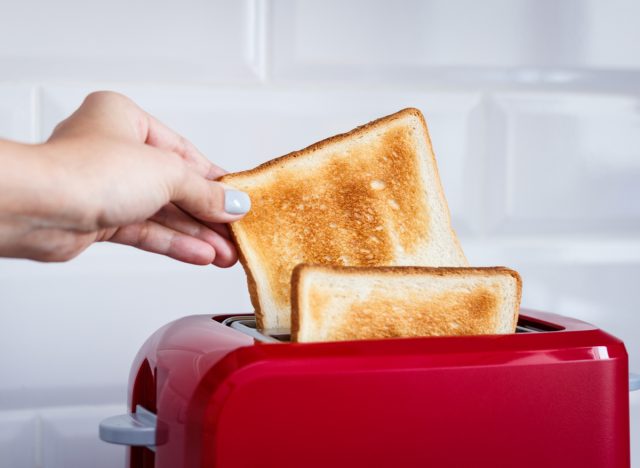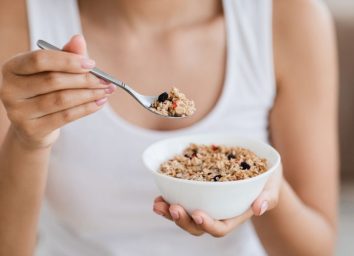6 Worst Breakfast Habits Slowing Your Metabolism

As soon as you take one bite of your favorite food or one sip of your favorite drink, your body starts working to convert these substances into energy it can use. The chemical processes enabling this conversion of food into energy are all thanks to your metabolism. This topic is almost always discussed alongside weight loss or weight management, because a slower metabolism burns fewer calories, while a faster one burns more. But even if we know that we want to aim for a speedy metabolic rate, it can feel overwhelming if we don’t know how to keep our metabolism operating at a healthy rate.
There are many factors that affect your metabolism, including your quality and quantity of sleep, how much exercise you get, your stress levels, and your diet. Also, as the first and arguably most important meal of the day, breakfat, in particular, is responsible for kicking your metabolism into high gear. But what does a healthy, metabolism-boosting breakfast really entail? And are there common habits we may have that are slowing our metabolism without us even realizing it?
In order to learn even more about which bad breakfast habits can impact your metabolism the most, we asked a few registered dietitians to weigh in on how such behaviors might slow down your metabolic rate. Read on for the worst breakfast habits for metabolism—then, be sure to check out the 5 Best Eating Habits to Help Boost Your Metabolism, Say Dietitians.
Not getting enough protein

We know it’s tempting to grab a muffin on your way out the door or pull into the drive through for a coffee and donut, but if you’re not eating enough protein in your day, which starts at breakfast, you may be doing a disservice to your metabolic health. For starters, protein can help you stay full and feel more satisfied, which can ultimately help contribute to losing or maintaining your goal weight.
Protein also has a direct impact on your metabolism and how your body burns calories. A study published in the Journal of Nutrition found that consuming 0.5 grams of protein for each pound you weigh can prevent your metabolic rate from slowing down after weight loss. That said, if you weigh 180 pounds, you should aim to consume at least 90 grams of protein throughout your day. And if you’re not starting with breakfast, that’s a ton of protein to try and pack in during the remaining two meals.
Skipping breakfast

“While many people think skipping breakfast is better for your metabolism, nothing could be further from the truth,” says Amy Goodson, MS, RD, CSSD, LD author of The Sports Nutrition Playbook and member of our Medical Expert Board. “Think of a fire. In order for it to start burning, you have to light it. Then you add small amounts of wood every couple of hours to keep it blazing. The same is true with your metabolism! You want to jumpstart it in the morning with a high-fiber carbohydrate and protein, then add small meals and snacks throughout the day to keep the fire burning.”
According to a recent review published in Nutrients, avoiding breakfast has been found to interrupt the body’s circadian rhythm, which is known to negatively impact your metabolism and overall health.
If you need some inspiration for an easy breakfast to make, “consider eggs, whole grain toast, and milk or oatmeal with nuts, seeds, and nut butter paired with Greek yogurt to kick off the day,” says Goodson.
Grabbing a ‘light’ breakfast

“So many people think they should eat something light for breakfast and save their calories for the rest of the day! That is a metabolism no-no,” says Goodson. “Instead the goal is to rev up your metabolism in the morning by ‘starting the fire,’ then continuously adding small amounts of wood (aka food) to keep it burning throughout the day.”
Instead of eating your smallest meal at the start of the day and eating larger meals later on, try eating a full, satisfying meal for breakfast that will set you up for success the rest of the day. “And typically when people start the day with a high-fiber, protein-rich breakfast, they tend to eat less at night and avoid some of those evening cravings,” says Goodson.
Starting your day with added sugar

“When you eat too much added sugar first thing in the morning, your blood sugar rises and then ceases,” says Lisa Young, PhD, RDN, author of Finally Full, Finally Slim and member of our Medical Expert Board.
Added sugar, especially in the form of sugary drinks, has been shown to slow down metabolism as well. In a study published in the European Journal for Clinical Nutrition, it was found that participants who were considered overweight and consumed heavy amounts of sugary beverages saw a drop in their metabolism.
“The healthiest breakfasts for your metabolism include a combination of nutrients and creating the perfect pair,” says Dr. Young. “For example, including protein, healthy carbs, and good fat like an omelet and adding greens and tomato, or including avocado for healthy fat on a slice of whole grain toast.”
Forgetting to hydrate

Another unhealthy breakfast habit for your metabolism is forgetting to stay hydrated first thing in the morning. “Your body needs water to function at a cellular level, so when you’re dehydrated your metabolism becomes sluggish,” says Kaleigh McMordie, MCN, RDN. “Be sure to include a drink, whether it be water, coffee, tea, or juice, with your breakfast. Better yet, drink a glass of water first thing in the morning to prevent dehydration.
Eating carbohydrates by themselves

Along the same lines of not starting your day with added sugars, Goodson warns that beginning your morning with only carbohydrates of any type can still cause a spike in blood sugar. And, over time, high blood sugar can lead to diabetes.
While your body needs carbohydrates for energy, if you eat them by themselves, they can often spike your blood sugar, causing it to drop later and setting you up for an energy crash. When your blood sugar drops, people often crave sugar and it sets them on a blood sugar roller coaster for the rest of the day,” she says.
Instead of only eating carbs, Goodson suggests balancing your breakfast out with protein.
“Protein helps you get full faster and stay full longer after a meal because, in comparison to carbohydrate and fat, it takes the longest to break down,” says Goodson. “While the thermic effect of food does not burn tons of calories, it does burn some, and protein revs that calorie burning system up. So, adding protein can help rev that metabolic process.”
A previous version of this story was published on August 2, 2022. It has been updated to include additional copy and proofreading revisions, additional research, and updated contextual links.









